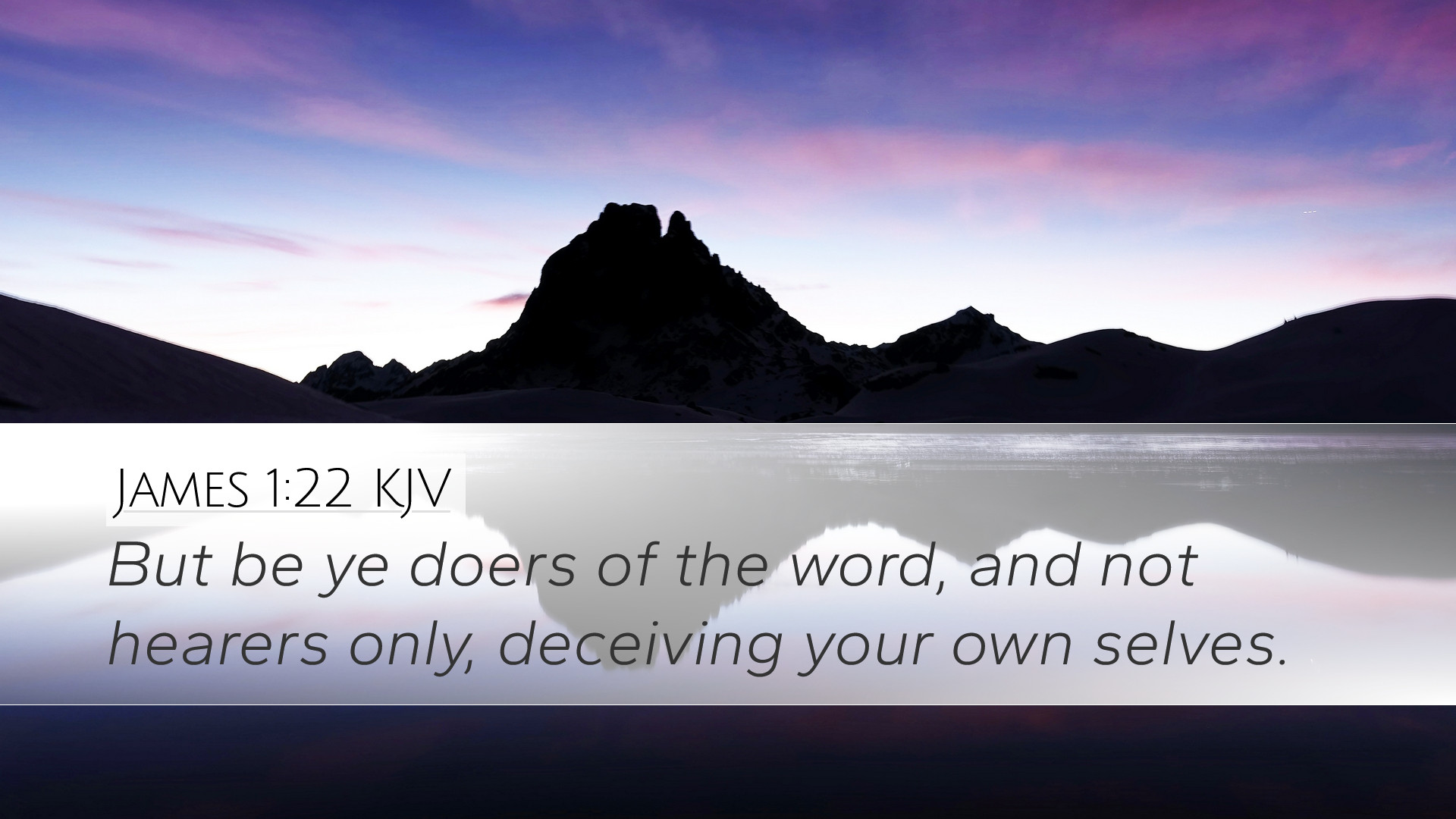Old Testament
Genesis Exodus Leviticus Numbers Deuteronomy Joshua Judges Ruth 1 Samuel 2 Samuel 1 Kings 2 Kings 1 Chronicles 2 Chronicles Ezra Nehemiah Esther Job Psalms Proverbs Ecclesiastes Song of Solomon Isaiah Jeremiah Lamentations Ezekiel Daniel Hosea Joel Amos Obadiah Jonah Micah Nahum Habakkuk Zephaniah Haggai Zechariah MalachiJames 1:22
James 1:22 KJV
But be ye doers of the word, and not hearers only, deceiving your own selves.
James 1:22 Bible Commentary
Commentary on James 1:22
Verse Text: "But be ye doers of the word, and not hearers only, deceiving your own selves."
Introduction
The epistle of James is often regarded as a practical manual for Christian living. In this particular verse, James emphasizes the essential relationship between faith and action. This commentary synthesizes perspectives from esteemed public domain sources, illuminating the profound implications of being "doers" of the Word.
Exegesis of the Verse
- Understanding "Be Ye Doers": Matthew Henry notes that James calls believers to active compliance with the teachings of Scripture. Mere intellectual acknowledgment of truth is insufficient; one must embody the teachings through conduct.
- The Danger of Hearing Only: Albert Barnes emphasizes that simply listening to God's Word can lead to self-deception. This form of deception arises when individuals think that passive reception equates to genuine obedience. He warns against complacency that comes from merely hearing without acting.
- The Word as a Directive: Adam Clarke highlights that "the word" refers to the entirety of the Christian message. It is not restricted to the Law but encompasses the teachings of Jesus and the apostles, underscoring a holistic adherence to the principles of the faith.
Theological Implications
- Your Own Selves: The phrase "deceiving your own selves" suggests a deeply personal consequence of neglecting action. Henry views this as a grave warning; the individual bears responsibility for their spiritual condition and the consequences of inaction.
- Faith and Works as Together: Barnes elaborates on the inseparability of faith and works, similar to the teachings found in Romans and other epistles. Understanding that faith without works is dead (cf. James 2:26) harmonizes with Paul's writings on the transformative nature of faith.
- Christian Responsibility: Clarke emphasizes the need for believers to not only know God's will but also to submit to it in practice. The real test of faith lies in its application, not merely in theoretical knowledge.
Practical Application
This verse invites a profound introspection for modern-day Christians. It challenges the church to examine the gap between hearing and doing. How often does the congregation engage with the Word yet fail to enact its teachings in daily life?
- Encouraging Active Faith: Pastors are urged to cultivate a culture of action within their congregations, promoting ministries that reflect the teachings of Scripture in community service, evangelism, and personal discipleship.
- Self-Examination: Believers are encouraged to regularly assess their lives against the Word. Are they merely hearers, or are they embodying the teachings of Christ in tangible ways?
- Teaching Methodologies: Educators within the church can utilize interactive methods that engage learners in doing. For instance, applied theology classes that not only teach doctrine but also provide avenues for practice can be transformational.
Conclusion
James 1:22 serves as a clarion call to action, beseeching believers to transcend passive reception of God’s Word. The insights offered through the lens of public domain commentaries articulate a pathway toward a more authentic Christian experience. The essence of this verse implores us to become not just informed Christians but active participants in the kingdom work.
Thus, let this verse resonate within the hearts of pastors, students, theologians, and scholars alike; prompting each individual towards a deeper, actionable faith.


